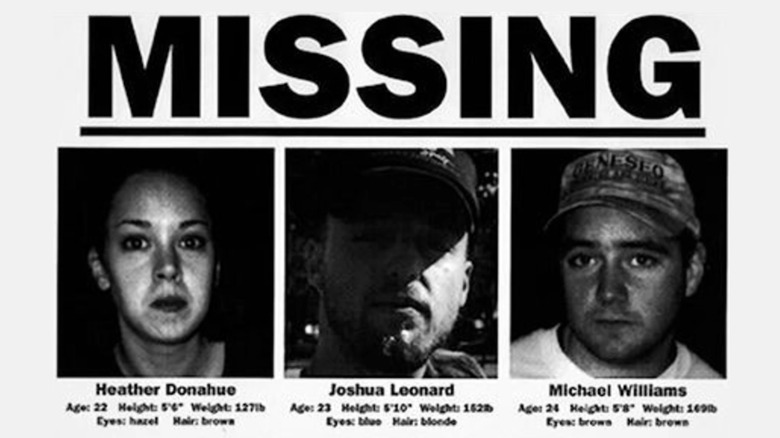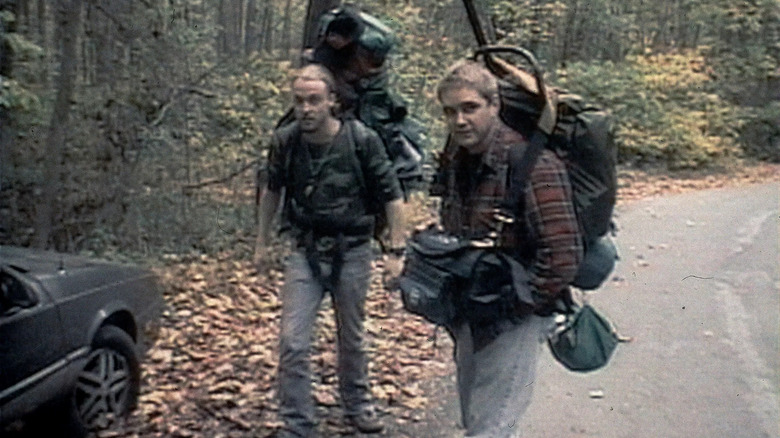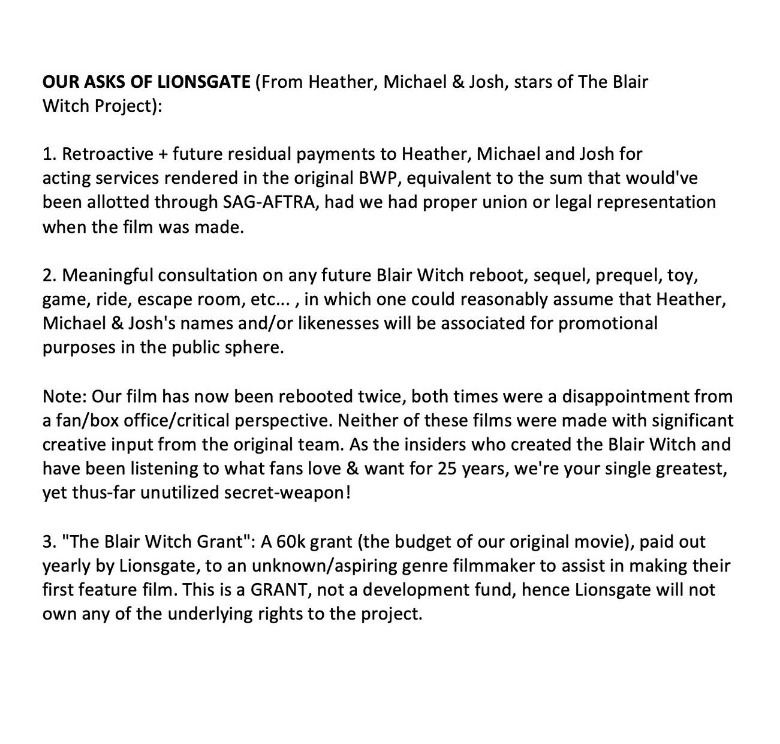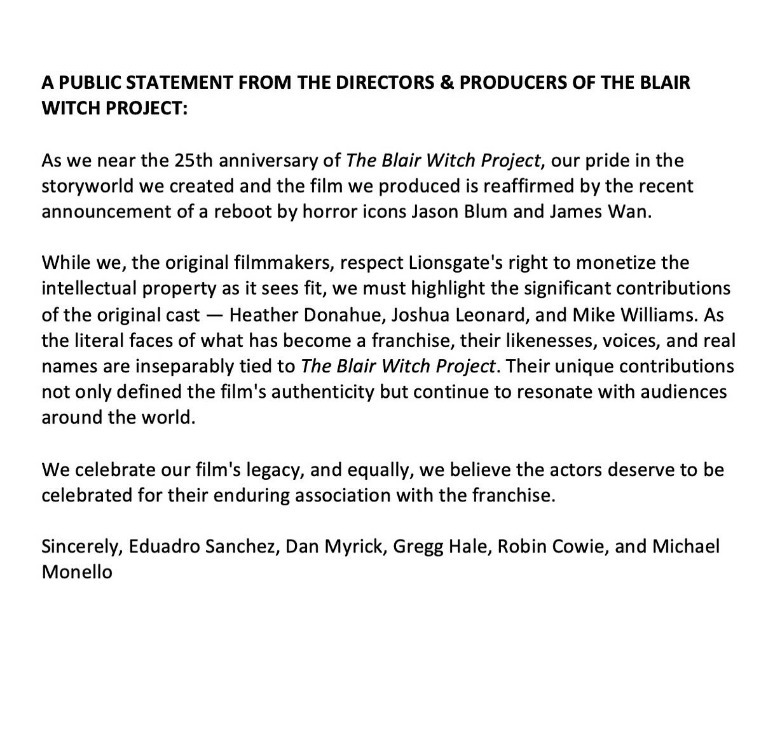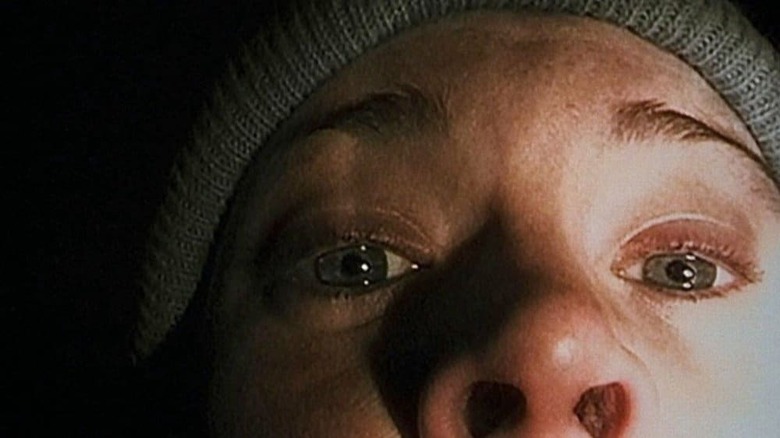The Original Blair Witch Project Trio Have Escaped The Woods, And Now They Want Residuals
"The Blair Witch Project" wasn't the first found footage horror film, but it is largely responsible for the explosion in found footage horror films over the last 25 years. A big reason for that? The numbers. Directed by Daniel Myrick and Eduardo Sánchez, "Blair Witch" was shot over just eight days with an initial outlay of just $35,000. It was bought by Artisan Entertainment for $1 million, and the studio spent around $6-8 million marketing it (per The Hollywood Reporter). The movie went on to gross more than $248 million at the box office.
It's a studio executive's dream to land a project like that, and studios have been chasing the high of "The Blair Witch Project" ever since (with some notable successes, like the "Paranormal Activity" franchise). There have been two "Blair Witch" movie sequels, with another "reimagining" recently announced by Blumhouse and Lionsgate. There have been books, comic books, and video games. It's a full-blown horror franchise that hasn't stopped making money since the moment it first hit theaters. Unfortunately, the three actors who spent those eight days in the woods, improvising most of the dialogue and creating some of the most unforgettable moments in "Blair Witch," have been cut out of its success since taking a $300,000 buyout each for their options on the film.
Though that might seem like a bad decision in hindsight, for three actors in their mid-20s a check for $300,000 must have seemed like a vast windfall. They were far from the first or last Hollywood creatives to be lured into a bad deal. But now, the original "Blair Witch" trio — Heather Donahue (who has since changed her name to Rei Hance), Joshua Leonard, and Michael C. Williams — want recognition for the film's success.
Older, wiser, more witch-proof
The scrappy production and shocking success of "The Blair Witch Project" led to legal spats right from the start, with Orlando filmmaker Sam Barber filing a lawsuit demanding a producer credit and a share of the profits mere weeks after it hit theaters. A few months later, Artisan Entertainment sued United Artists and Regal Cinemas for allegedly failing to pay license fees. Shortly afterwards, the original trio of actors filed a complaint when the sequel "Book of Shadows: Blair Witch 2" used footage and images of Heather, Josh, and Mike without their permission or any offer of compensation. The original film was a non-union production, so the three main actors didn't have the kind of protections and guarantees that would have come with a SAG-AFTRA contract.
This time around, they're not coming out of the gate with a lawsuit but with a straightforward appeal to Lionsgate, which bought the rights to the franchise in 2003. Joshua Leonard shared the appeal on his Facebook page, alongside a supportive statement from the film's producers and directors.
The appeal may have been inspired by last year's Hollywood strikes, in which both actors and writers fought fiercely for months over the terms of their new contracts with Hollywood studios. Leonard writes that they were "starry-eyed young actors" in 1999 but are now "grown-ass adults ... greyer, surlier, wiser, and with far fewer f***s to give when it comes to speaking up for their own rights and the rights of other artists who are being been put in similar compromised/extractive positions by a dehumanizing system at this very moment!"
The actors who caught lightning in a bottle
To refer to Heather, Mike, and Josh only as actors in "The Blair Witch Project" is really underselling their role, which also involved shooting all of the footage and effectively writing the script in real time as they improvised their lines. Though they faced more trouble than they signed up for after the film's release ("[I had] people coming up to me on the street telling me that they wished I was dead, saying they want their money back," Hance told Vice in 2016), they were completely game for the hardships, challenges, and terrors of the eight-day shoot. "They let us know that our safety was their concern, but our comfort was not," said Hance. "We knew it was definitely going to be 24/7. We knew that it was going to be uncomfortable."
The trio were left alone in the woods as much as possible, following GPS waypoints to get to their next location as the production team snuck around leaving creepy items at their camp and "haunting" them at night. They had a walkie talkie and a safe word — "Bulldozer" — in case of injuries or emergencies. (Production designer Ben Rock revealed that the one time they actually cried "Bulldozer," the batteries on the corresponding walkie-talkie at basecamp were flat and no one heard them.) The actors' talent for improv and their genuine stress and discomfort combined to create some of the most electric moments in horror history — from Heather's unforgettable "apology" monologue to the terrifying final few minutes of the film.
There's no question that they're responsible in large part for the success of "The Blair Witch Project," and this seems like a good-faith request for Lionsgate to honor their contribution — and to let them help with the upcoming film. The studio might want to consider making a deal. As Ben Rock recently pointed out, following the announcement of the latest "Blair Witch" reboot:
"What has happened twice now was that the original creators were overlooked, and other people were brought in, all of whom were good. But neither one of the sequels connected with audiences the way they wanted it to connect. And so it might at least be worth talking to some of the original creators."
